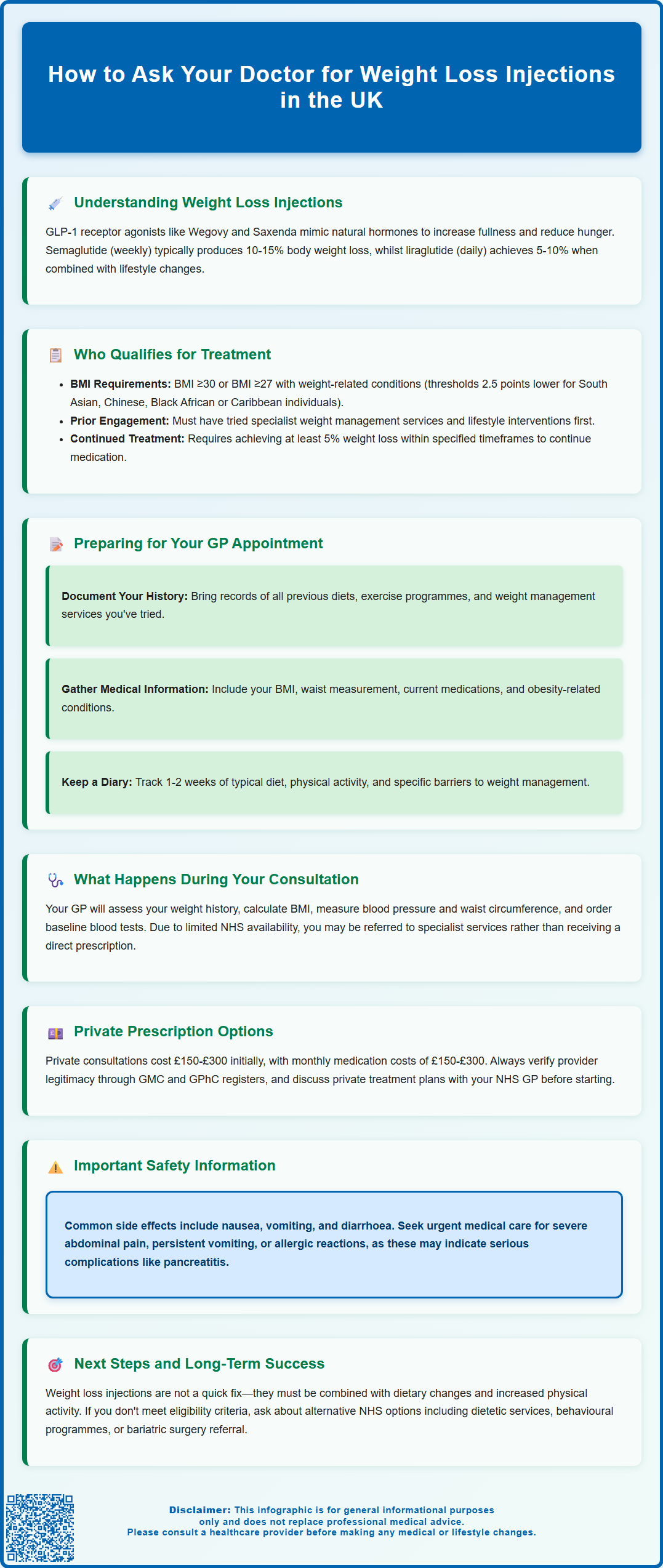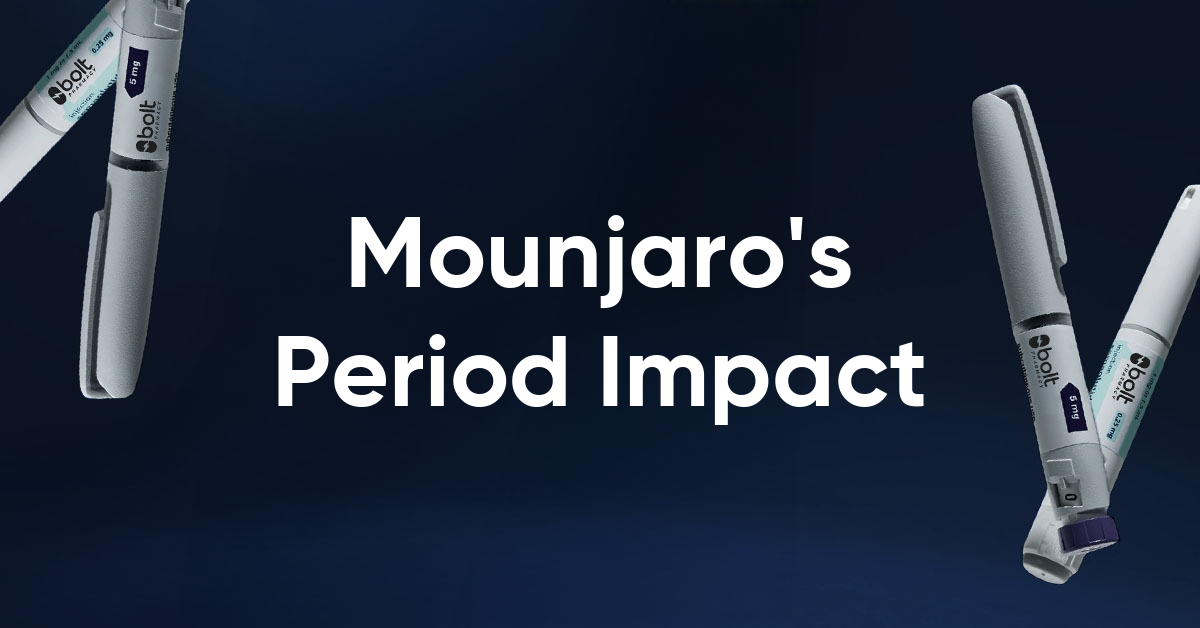Discussing weight loss injections with your GP requires preparation and understanding of NHS eligibility criteria. GLP-1 receptor agonists such as semaglutide (Wegovy) and liraglutide (Saxenda) are prescription medications approved for obesity management in adults meeting specific clinical thresholds. These injections work by regulating appetite and are used alongside lifestyle modifications, not as standalone treatments. Access through the NHS is currently limited, with strict criteria based on BMI, comorbidities, and prior engagement with weight management services. This guide explains how to prepare for your consultation, what to expect during assessment, and alternative pathways if NHS provision is unavailable in your area.
Summary: To ask your doctor for weight loss injections, prepare documentation of your weight history and health conditions, understand NHS eligibility criteria (typically BMI ≥30 or ≥27 with comorbidities), and request assessment for GLP-1 receptor agonists during a comprehensive GP consultation.
- GLP-1 receptor agonists (semaglutide, liraglutide) are prescription medications that regulate appetite by mimicking natural hormones, administered via subcutaneous injection weekly or daily.
- NHS eligibility requires BMI ≥30 kg/m² (or ≥27 kg/m² with comorbidities such as type 2 diabetes or hypertension), with lower thresholds for certain ethnic backgrounds.
- Most GP surgeries cannot prescribe directly; referral to specialist weight management services is typically required, with treatment continuing only if specific weight loss targets are achieved.
- Common adverse effects include gastrointestinal symptoms (nausea, vomiting, diarrhoea); serious risks include pancreatitis and gallbladder disease requiring monitoring.
- Private prescription options exist but involve significant ongoing costs; all prescribing should follow licensed indications with proper medical assessment and monitoring.
Table of Contents
- Understanding Weight Loss Injections Available in the UK
- NHS Eligibility Criteria for Weight Loss Injections
- Preparing for Your GP Appointment About Weight Loss Treatment
- What to Expect During Your Consultation
- Private Prescription Options and Costs
- Next Steps After Your Doctor's Assessment
- Frequently Asked Questions
Understanding Weight Loss Injections Available in the UK
Weight loss injections, medically termed anti-obesity medications (AOMs), have become an increasingly discussed treatment option for individuals struggling with obesity or weight-related health conditions. In the UK, the primary medications available are GLP-1 receptor agonists (glucagon-like peptide-1 analogues), which include semaglutide (marketed as Wegovy) and liraglutide (Saxenda). These medications work by mimicking natural hormones that regulate appetite and blood sugar levels.
The mechanism of action involves binding to GLP-1 receptors in the brain, particularly in areas controlling appetite and food intake. This leads to increased feelings of fullness (satiety), reduced hunger, and slower gastric emptying, which collectively help patients consume fewer calories. Semaglutide is administered once weekly via subcutaneous injection, whilst liraglutide requires daily administration. Clinical trials show different weight loss outcomes: semaglutide typically results in 10-15% body weight reduction, while liraglutide generally achieves 5-10% weight loss when combined with lifestyle modifications.
It is important to understand that these injections are not cosmetic treatments but prescription medicines indicated for specific medical conditions. The Medicines and Healthcare products Regulatory Agency (MHRA) has approved these medications for weight management in adults with obesity (BMI ≥30 kg/m²) or those who are overweight (BMI ≥27 kg/m²) with at least one weight-related comorbidity such as type 2 diabetes, hypertension, or obstructive sleep apnoea. For people of South Asian, Chinese, Black African or Caribbean backgrounds, lower BMI thresholds may apply (typically 2.5 kg/m² lower). These medications are designed to be used alongside a reduced-calorie diet and increased physical activity, not as standalone solutions.
Common adverse effects include nausea, vomiting, diarrhoea, constipation, and abdominal discomfort, particularly during the initial titration phase. Most gastrointestinal symptoms improve over time as the body adjusts to the medication. More serious but less common risks include pancreatitis, gallbladder disease, and dehydration potentially leading to acute kidney injury. These medications are not recommended during pregnancy or breastfeeding, and effective contraception should be used by women of childbearing potential. Understanding these fundamentals will help you have an informed conversation with your healthcare provider about whether weight loss injections might be appropriate for your circumstances.

NHS Eligibility Criteria for Weight Loss Injections
The National Institute for Health and Care Excellence (NICE) provides specific guidance on who may be eligible for weight loss injections through the NHS. Access to these medications on the NHS is currently limited and subject to strict criteria due to supply constraints and resource allocation considerations. Understanding these criteria before your appointment will help set realistic expectations.
According to NICE Technology Appraisals (TA875 for semaglutide/Wegovy and TA664 for liraglutide/Saxenda), adults may be considered for pharmacological intervention for weight management if they have:
-
A BMI of 30 kg/m² or above, or
-
A BMI of 27 kg/m² or above with associated comorbidities such as type 2 diabetes, cardiovascular disease, hypertension, dyslipidaemia, or obstructive sleep apnoea
-
For people of South Asian, Chinese, Black African or Caribbean backgrounds, these thresholds are typically reduced by 2.5 kg/m²
-
Evidence of having engaged with specialist weight management services and lifestyle interventions
-
No contraindications to the medication
Currently, NHS England has implemented a specialist service pathway for semaglutide (Wegovy), prioritising patients with the highest clinical need. This typically includes individuals with a BMI ≥35 kg/m² and at least one obesity-related comorbidity, or those with type 2 diabetes and specific BMI thresholds. Many Integrated Care Boards (ICBs) have additional local restrictions due to medication shortages and budget constraints.
It is worth noting that most GP surgeries cannot prescribe these medications directly. Many areas require referral to specialist weight management services (tier 3 or 4 obesity services) before prescription can be considered. Your GP can advise whether such services are available in your area and facilitate appropriate referrals.
For continued NHS treatment, specific criteria must be met. For semaglutide, treatment typically continues only if at least 5% weight loss is achieved after 6 months. NHS treatment with Wegovy is usually limited to a maximum of 2 years. For liraglutide, treatment should only continue beyond 12 weeks if at least 5% of initial body weight has been lost. Being aware of these criteria will help you understand the pathway and prepare appropriate documentation of your weight management journey.
Preparing for Your GP Appointment About Weight Loss Treatment
Thorough preparation before your appointment will demonstrate your commitment to addressing your weight concerns and help your GP make an informed assessment. Start by documenting your weight history, including previous attempts at weight loss, diets tried, exercise programmes undertaken, and any commercial weight management services you have accessed. This evidence shows you have made genuine efforts to lose weight through conventional means.
Gather relevant medical information including:
-
Your current weight and height (calculate your BMI beforehand using the NHS BMI calculator, which includes ethnicity-specific guidance)
-
Your waist circumference measurement, if possible
-
Records of weight measurements over time, if available
-
List of current medications and any allergies
-
Family history of obesity, diabetes, or cardiovascular disease
-
Documentation of obesity-related health conditions (blood pressure readings, HbA1c results if diabetic, sleep study results if applicable)
-
Details of how your weight affects your daily life, mobility, mental health, and quality of life
-
Information about pregnancy status or plans to become pregnant, as these medications are not recommended during pregnancy or breastfeeding
Consider keeping a brief diary for 1-2 weeks before your appointment noting your typical dietary intake, physical activity levels, and any barriers you face in managing your weight (such as mobility limitations, shift work affecting eating patterns, or mental health challenges). This provides concrete examples to discuss with your GP.
Prepare specific questions you wish to ask, such as:
-
Am I eligible for weight loss injections on the NHS?
-
What are the potential benefits and risks for someone with my health profile?
-
Are there local specialist weight management services I should be referred to?
-
What lifestyle support is available alongside medication?
-
What are the alternatives if I'm not eligible for NHS prescription?
Finally, approach the conversation with realistic expectations. Your GP may need to conduct initial assessments, blood tests, or referrals before any treatment decisions can be made. Being prepared, honest, and open to a comprehensive weight management approach will facilitate a productive consultation and demonstrate your readiness for treatment.
What to Expect During Your Consultation
During your consultation, your GP will conduct a comprehensive assessment to determine whether weight loss injections are appropriate and safe for you. The appointment will typically begin with a discussion of your weight history, previous weight loss attempts, and the impact of your weight on your physical and mental health. Be prepared to discuss sensitive topics openly, as this information is crucial for proper assessment.
Your GP will perform or arrange several clinical assessments, including:
-
Measurement of your weight, height, and BMI calculation
-
Blood pressure measurement
-
Waist circumference measurement (an indicator of central obesity and metabolic risk)
-
Review of your medical history, including cardiovascular risk factors
-
Discussion of special warnings and precautions (such as personal or family history of medullary thyroid carcinoma or multiple endocrine neoplasia syndrome type 2, which require careful consideration in the UK)
-
Assessment of pregnancy status or plans, as these medications are not recommended during pregnancy or breastfeeding
Your doctor will likely order baseline blood tests if recent results are not available. These typically include HbA1c (to assess diabetes status), lipid profile, liver function tests, kidney function (eGFR), and thyroid function tests. If you have diabetes, your retinal status may be assessed, as semaglutide can potentially worsen diabetic retinopathy in some patients. These investigations help identify obesity-related complications and ensure it is safe to prescribe weight loss medications.
The GP will explain the realistic expectations of treatment, emphasising that weight loss injections are not a quick fix but part of a comprehensive approach requiring dietary changes, increased physical activity, and behavioural modifications. They will discuss potential side effects, the need for gradual dose titration, and the importance of regular monitoring. They will also advise that these medications should not be used alongside other GLP-1 receptor agonists.
If you meet the criteria, your GP may initiate a referral to specialist weight management services rather than prescribing directly. Alternatively, they may explain that NHS provision is currently limited in your area and discuss private prescription options. If you do not meet the criteria, your GP should explain why and discuss alternative approaches, such as referral to dietetic services, structured weight management programmes, or psychological support if emotional eating is a factor. Remember that a decision not to prescribe does not reflect a lack of concern but rather adherence to clinical guidelines and safety protocols designed to ensure appropriate use of these medications.
Private Prescription Options and Costs
If you do not meet NHS eligibility criteria or face long waiting times for specialist services, private prescription may be an alternative route to access weight loss injections. Several options exist, each with different cost implications and levels of medical oversight.
Private GP services and weight management clinics offer consultations specifically for weight loss medication assessment. Reputable providers will conduct thorough medical assessments similar to NHS protocols, including review of medical history, physical examination, and baseline blood tests. Initial consultation fees typically range from £150-£300 (as of 2023), with follow-up appointments costing £50-£150. These consultations may be conducted face-to-face or via telemedicine platforms.
The medication costs represent the most significant expense:
-
Semaglutide (Wegovy): approximately £200-£300 per month depending on dose
-
Liraglutide (Saxenda): approximately £150-£250 per month
These costs are approximate, subject to change, and ongoing for the duration of treatment, which may extend for 12-24 months or longer. Some providers offer package deals or subscription models that include medication, consultations, and support services.
When considering private options, it is essential to verify the legitimacy of the provider. The General Medical Council (GMC) register allows you to check that prescribing doctors are properly registered and licensed. The General Pharmaceutical Council (GPhC) register confirms that pharmacies are legitimate. When using online pharmacies, look for the GPhC internet pharmacy logo. Be extremely cautious of websites offering these medications without proper medical assessment, as counterfeit products pose serious health risks.
Reputable private providers should offer:
-
Comprehensive initial medical assessment
-
Regular monitoring and follow-up appointments
-
Access to healthcare professionals for questions or concerns
-
Nutritional and lifestyle support alongside medication
-
Clear protocols for managing side effects
Some private providers also offer shared care arrangements with your NHS GP, where the private specialist initiates and monitors treatment whilst your GP provides ongoing prescriptions. However, NHS GPs are not obligated to participate in such arrangements. Before committing to private treatment, discuss your plans with your NHS GP to ensure continuity of care and that your medical records are appropriately updated. Remember that responsible private prescribing should follow licensed indications and safety monitoring requirements—these medications should not be prescribed for cosmetic weight loss in individuals who do not meet clinical thresholds.
Next Steps After Your Doctor's Assessment
Following your consultation, several pathways may unfold depending on your individual circumstances and your GP's assessment. Understanding these potential next steps will help you navigate the process effectively.
If you are deemed eligible and your GP can prescribe, you will receive detailed instructions on medication administration, dose titration schedule, and management of potential side effects. You will be taught how to perform subcutaneous injections safely, with many surgeries offering practice sessions with training devices. Your GP will schedule regular follow-up appointments (typically monthly initially, then every 3-6 months) to monitor your progress, assess side effects, and adjust treatment as needed. You should be provided with safety netting advice, including when to seek urgent medical attention—such as severe abdominal pain (which could indicate pancreatitis), right upper quadrant pain/fever/jaundice (gallbladder disease), persistent vomiting leading to dehydration, or signs of allergic reaction. For these situations, contact NHS 111 or seek urgent care as appropriate.
If referral to specialist services is required, waiting times vary considerably by region, ranging from a few weeks to several months. Whilst awaiting your appointment, continue engaging with lifestyle modifications and consider asking your GP about interim support such as dietetic referral or community weight management programmes. Keep a record of your weight, dietary habits, and any health changes to share with the specialist team.
Should you not meet eligibility criteria, discuss alternative evidence-based approaches with your GP, including:
-
Referral to NHS dietetic services
-
Structured behavioural weight management programmes
-
Assessment for psychological factors affecting eating behaviours
-
Treatment optimisation for conditions that may contribute to weight gain (such as hypothyroidism or depression)
-
In cases of severe obesity, discussion of bariatric surgery referral criteria
Regardless of the outcome, commit to lifestyle modifications that form the foundation of any successful weight management strategy. The NHS provides free resources including the NHS Weight Loss Plan app and local services that can support dietary changes and physical activity increases. If you pursue private treatment, ensure your NHS GP is informed so they can provide appropriate ongoing care and monitor for any complications.
Remember that weight management is a long-term journey rather than a quick fix. Whether you access weight loss injections or pursue alternative approaches, sustainable results require ongoing commitment to healthier eating patterns, regular physical activity, and behavioural changes. Maintain open communication with your healthcare team, attend all scheduled appointments, and do not hesitate to seek support when facing challenges. If you experience any suspected side effects from medication, report them through the MHRA Yellow Card scheme (yellowcard.mhra.gov.uk). Your GP remains your primary point of contact for any concerns about your weight management journey or overall health.
Frequently Asked Questions
What BMI do I need to qualify for weight loss injections on the NHS?
You typically need a BMI of 30 kg/m² or above, or 27 kg/m² or above with weight-related comorbidities such as type 2 diabetes or hypertension. For people of South Asian, Chinese, Black African or Caribbean backgrounds, these thresholds are usually 2.5 kg/m² lower.
Can my GP prescribe weight loss injections directly?
Most GP surgeries cannot prescribe weight loss injections directly due to NHS England pathways requiring referral to specialist weight management services. Your GP can assess eligibility and facilitate appropriate referrals to tier 3 or 4 obesity services where available.
How much do weight loss injections cost privately in the UK?
Private costs include initial consultation fees of £150-£300 and ongoing medication costs of approximately £150-£300 per month depending on the specific medication (semaglutide or liraglutide) and dose. Treatment typically continues for 12-24 months or longer.
The health-related content published on this site is based on credible scientific sources and is periodically reviewed to ensure accuracy and relevance. Although we aim to reflect the most current medical knowledge, the material is meant for general education and awareness only.
The information on this site is not a substitute for professional medical advice. For any health concerns, please speak with a qualified medical professional. By using this information, you acknowledge responsibility for any decisions made and understand we are not liable for any consequences that may result.
Heading 1
Heading 2
Heading 3
Heading 4
Heading 5
Heading 6
Lorem ipsum dolor sit amet, consectetur adipiscing elit, sed do eiusmod tempor incididunt ut labore et dolore magna aliqua. Ut enim ad minim veniam, quis nostrud exercitation ullamco laboris nisi ut aliquip ex ea commodo consequat. Duis aute irure dolor in reprehenderit in voluptate velit esse cillum dolore eu fugiat nulla pariatur.
Block quote
Ordered list
- Item 1
- Item 2
- Item 3
Unordered list
- Item A
- Item B
- Item C
Bold text
Emphasis
Superscript
Subscript












